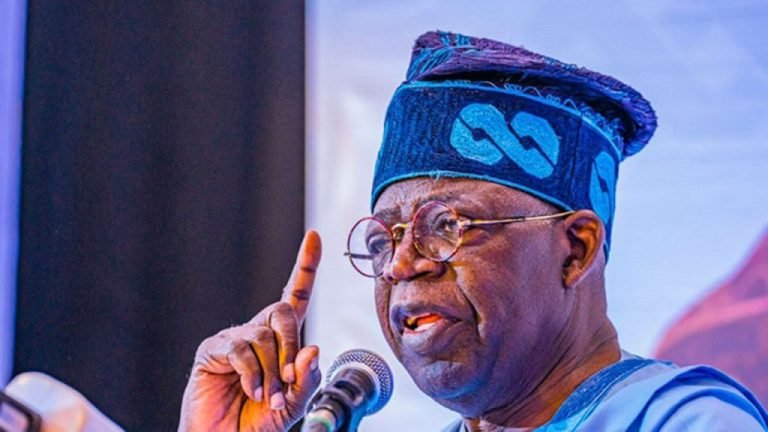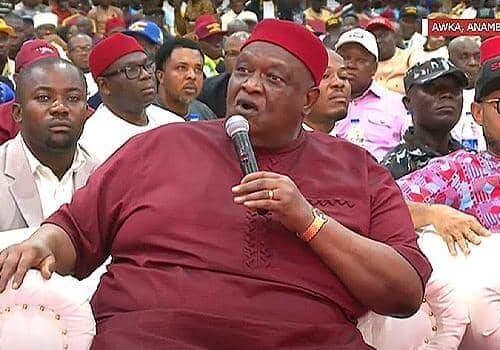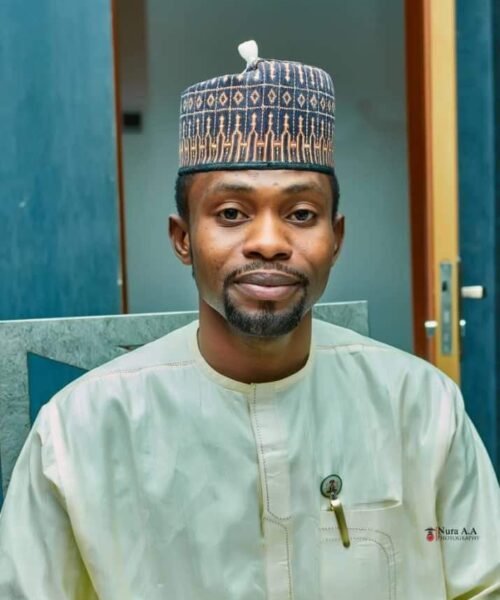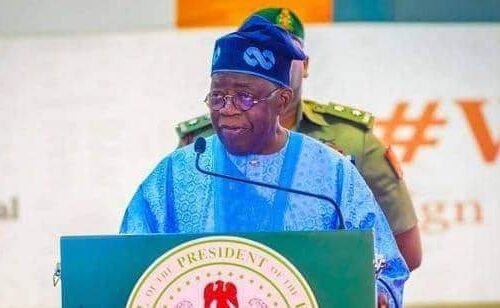Tinubu Proposes N27 Trillion Budget Size, Reconstitutes NNPC Board, Management Without N’Deltan At The Helm
Tinubu
Expectedly, President Bola Tinubu will be presenting the country’s highest budget proposal since the return of civil rule in 1999, to the National Assembly for legislative action this Wednesday.
The Tinubu administration is proposing a budget size of N27 trillion for the 2024 fiscal year. Disturbingly, the president does not seem to find the Niger Delta, the oil and gas region that is still contributing more than 80 percent of Nigeria’s earnings fit enough to head the state oil corporation, Nigerian National Petroleum Company (NNPC) Limited.
Tinubu reappointed Mele Kyari as the Group Chief Executive Officer of NNPC to continue the “good work” he is doing in the last two and a half years or thereabout. He also approved the appointment of a new board and management team for the oil corporation with effect from December 1, 2023.

Tinubu appointed his kinsman,Pius Akinyelure,as the Non-Executive Board Chairman, Umar Isa Ajiya was named the Chief Financial Officer, while Ledum Mitee, an Ogoni from Rivers State, was appointed as the Non-Executive Director.
Industry watchers say Akinyelure’s appointment is coming some five months after the president’s dissolution of the board of federal government agencies and parastatals including NNPC.
Interestingly, the new NNPC board chair is a seasoned and distinguished administrator, and an oil industry practitioner who retired from Mobil Oil Nigeria Plc on June 1, 1997 as Executive Director, Finance and External Relations. He is a certified accountant with a Master of Science degree in Management, specialising in organisational behaviour.

He has over 30 years working experience in the oil industry at top management/executive levels, both Upstream and Downstream. He was first appointed into the board of the NNPC in 2016 by former President Muhammadu Buhari. He was reappointed into the NNPC board in May 2020 by Buhari
He has been Chairman/Director of several companies/financial institutions in the past, which include Wema Bank Plc, Credit Bank Ltd, Odu’a Investment Limited, Oluwa Glass Plc, Okitipupa Oil Palm Plc, Odu’a Telecommunications Limited, Cocoa Industries Nigeria Ltd, Hallmark Bank and West African Portland Cement Plc.
He was also pioneer Vice Chairman of the All Progressives Congress (APC) from 2014-2018. Akinyelure is a philanthropist who has received commendations particularly for rehabilitating deplorable township roads in some communities in Ondo State His hobbies include traveling, listening to music, networking and philanthropy.
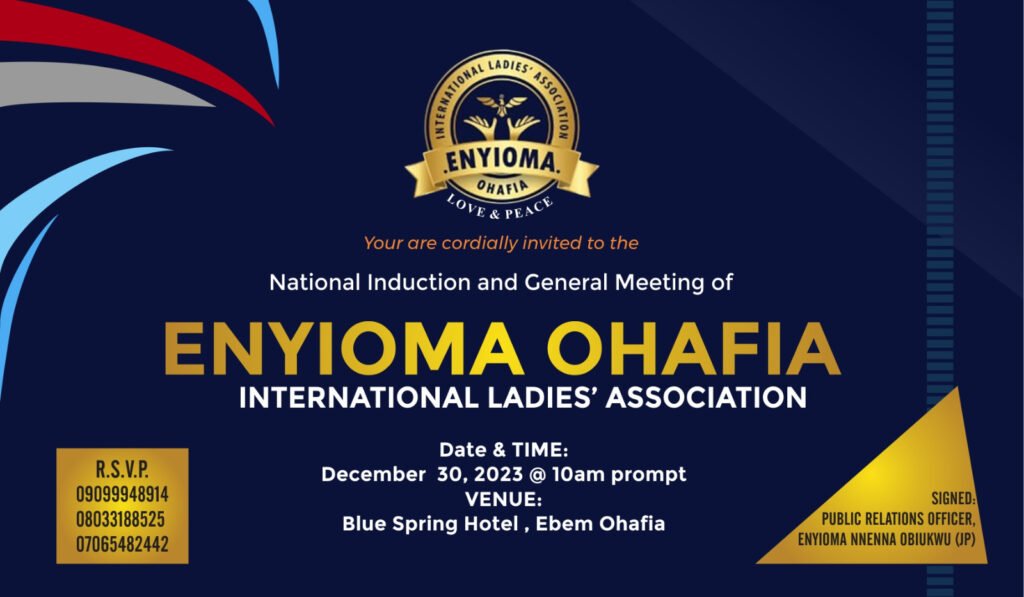
Others appointed as Non-Executive Directors include Musa Tumsa, Ghali Muhammad, Prof. Mustapha Aliyu, David Ogbodo, and Eunice Thomas. The appointments were made known in a statement by Tinubu’s Special Adviser on Media and Publicity, Ajuri Ngelale.
Ngelale noted that his principal also approved the appointment of two permanent secretaries. They are Okokon Ekanem Udo, as Permanent Secretary of the Federal Ministry of Finance; and Amb. Gabriel Aduda, as Permanent Secretary of the Federal Ministry of Petroleum Resources
“President Tinubu anticipates the fullest measure of compliance with the performance-driven and results-oriented mandate of his Renewed Hope administration in the implementation of energy policy that will monetize all available oil and gas resources of today while paving the way for the total exploitation of new and cleaner energy sources of tomorrow by this distinguished team”, the presidential spokesman says.
NNPC is, however, promoting itself as a dynamic global energy company with businesses and operations across the entire spectrum of the energy value chain. “Our mandate is to create an energy business that is efficient and resilient”, the company says, adding, “we are focused on energy transition while ensuring domestic energy security.”
NNPC Businesses
*Upstream: This is concerned with ensuring maximum economic performance of upstream activities through development of oil and gas reserves to achieve production targets in a safe and sustainable manner.
*Gas & Power: To unlock stranded gas and increase commercial gas volumes by expanding investments in gas processing and transmission networks and access untapped markets to service existing and new gas-based industries, power, and LNG projects.
*New Energy: To provide sustainable, low-carbon energy solutions for end users through investment, commercial production, supply of carbon neutral fuels, renewable energy such as Solar; Renewable power, Biofuels – Fuel Ethanol, Biodiesel, Biogas, wind etc., while engaging in Greenhouse Gases (GHG) emission reduction projects and services.
*Downstream: To ensure maximum economic performance and energy supply stability for the domestic market through customer focused and sustainable business operations.
*Non-Energy: To create, deliver and capture value from viable non-core energy business ventures through the instrumentality of NNPC Non-Energy Investment Services (NNIS), and NNPC Foundation Limited/Gte
Some authorities have repeatedly disclosed that petroleum oil from the Niger Delta, provides more than 95 percent of export earnings, accounting for more than 80 percent of government revenue, and generates over 40 per cent of the Gross Domestic Product (GDP).
The region’s economy is dominated by the oil industry, which has wrecked most of the oil-bearing communities with pollution that has equally destroyed the means of livelihood of the local people. Though the industry accounts nationally for only 0.15% of employment, the region still contributes 80% of the country’s revenue and 74% of export earnings.
For instance, in 2022, agriculture, largely from Northern Nigeria, contributed about 23.69 percent to the country’s GDP, 30.78 percent came from industry, and 44.04 percent from the services sector.
The most common breakdown of economic activity in a country is looking at three economic sectors: The primary sector, which involves agriculture, forestry, and fishing, the secondary sector, industry, that includes manufacturing, processing, or transforming goods, and finally, the tertiary sector, services, that is, providing information or services to consumers, such as in IT, tourism, or banking.
Those who know better say a country’s contribution to GDP, and thus its own economy, is easily visible when looking at the performance of these three sectors.
Findings tend to reveal that the services sector is gaining momentum in Nigeria because more and more people are migrating from the countryside to the cities to find jobs. Nigeria is a mixed economy which focuses mainly on telecommunications, financial services, and technology, a strategy that is likely to pay off in the future and will see its GDP soaring.
Unarguably, Nigeria’s reliance on oil is an important contributor to its economic success. For instance, between 2001 and 2010, it was one of the countries with the highest GDP growth worldwide. Interestingly, petroleum economists say, oil prices are also responsible for a GDP growth slump in 2016 and for the first trade deficit in over a decade.
The Executive Council of the Federation has already approved the N27 trillion budget size proposed for 2024. The approval was on Monday at its weekly meeting presided over by President Tinubu.
Last October 16, Minister of Planning and Budget, Atiku Bagudu, announced that the Tinubu administration was proposing N26 trillion for the 2024 budget. Initially, the budget proposal, according to him, was to be submitted to the National Assembly before December 31.
He said the 2024-2025 Medium-Term Expenditure Framework (MTEF) which was passed by the Legislative arm of the Nigerian government, has been further reviewed, adding that the targeted revenue for next year is N18 trillion.
While the MTEF that was passed by the federal legislators has an exchange rate of N700 to a dollar and a crude oil benchmark of $73, to therefore improve revenue, the Council reviewed the MTEF with an exchange rate of N750 to a dollar, and a crude oil benchmark of $77.
The logic of the Tinubu cabinet is that this will significantly improve revenue. However, spokesperson of the House of Representatives, Akin Rotimi, said the budget will be presented to the National Assembly this week, assuring, “I can confirm that the 2024 Appropriation Bill is expected to be presented to the National Assembly by the federal government this week.”
Noticeably, between 2016 and 2022, the country’s annual budget has skyrocketed from N6.06 trillion to N17.12 trillion. In 2023, former President Buhari signed N21.83 trillion into law as the year’s budget.
Yet, early this November, Tinubu signed a supplementary budget of N2.17 trillion into law to enable his administration to address urgent security and economic needs of the country.
He commended the National Assembly for its expeditious consideration and approval, and assured Nigerians that the Executive arm of government will ensure the judicious use of the budgeted resources.
The National Assembly on November 2, speedily passed the supplementary budget for the third reading, and passed it after Chairman of the Senate Committee on Appropriation, Solomon Olamilekan, presented its report. During his presentation, he said there was a need for the country to take advantage of the coming dry season to implement some projects like road construction, hence the need for the budget to pass speedily.
Before assenting to the supplementary budget, some line items sparked outrage. Some of the items include: the request for N4.00 billion for the renovation of the residential quarters for the president in Abuja; the renovation of the residential quarters of the vice-president at N2.5 billion.
Others are the request to purchase a presidential yacht at N5 billion; vehicles for the office of the first lady at N1.5 billion; SUVs for the Presidential Villa at N2.9 billion; and the replacement of operational vehicles for the presidency at N2.9 billion.
In a statement later, Ngelale explained that the newly approved expenditure for defence and security consists of about 30 percent, pointing out that 35 percent of the budget is dedicated to the provision of critical infrastructure to be allocated to the federal ministries of works, the Federal Capital Territory (FCT), and housing and urban development.
Abuja claims that 32 percent of the supplementary budget is allocated to the new wage award for treasury-paid federal workers to cushion the effect of the removal of petrol subsidy, “in addition to cash transfers to vulnerable persons, and support to the Independent National Electoral Commission (INEC), among other considerations”.
Meanwhile, the National Assembly has said that it will convene a town hall meeting to allow citizens to make inputs into the proposed N27 trillion appropriation, the first substantive budget proposal of the Tinubu administration.

SPECIAL ADVERT PROMO FOR 2023 IGBA-OTOMU, IGBA-UCHE, IGBA-EKPE, IZU-UCHE, IGBOTONMA AND IZA-AFA
This is a special promo designed for our brothers, sisters, mothers, fathers etc who are involved in the above events and others not mentioned during this Xmas period to reach out and showcase their event to the entire world at highly subsidized rate.
PACKAGE:
First Leg: Full page Promotional package showcasing your Invitation Card, Banner/Flex, 3 different Photographs and brief of the coming event. Also your picture/Name will be the headline News in AttNews blog(Pre-Event)
Second Leg: Full Page Promotional package of the event showcasing 5 different photographs. Also your picture/Name will be the headline news in AttNews blog(Post-Event).
Rate: N20,000 Only For Both Pre and Post Events. (Rate is only Applicable during the Promotional Period)
For further inquiries, contact the undersigned:
Dr. Uduma Nnate (Publisher)
08132260609
Chief Imo Ukwa(Advert Consultant) 08063779938

